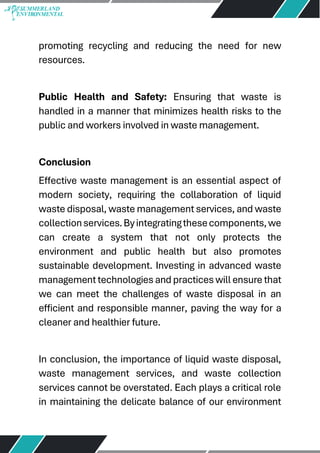Getting The Reclaim Waste To Work
Getting The Reclaim Waste To Work
Blog Article
Some Known Factual Statements About Reclaim Waste
Table of ContentsReclaim Waste Fundamentals ExplainedSome Known Details About Reclaim Waste Examine This Report about Reclaim WasteSome Of Reclaim WasteEverything about Reclaim Waste
Check out the kinds, incidents, and types of liquid waste. Domestic sewage waste refers to the waste and products from a residential sewage-disposal tank. This sort of waste is created by human beings in homes, schools, and other structures. This only includes sewage-disposal tanks that have a drainpipe area. The proper administration and disposal of residential sewer waste require fluid waste to be moved to a sewage therapy plant where the appropriate methods and equipment are used to detoxify and deal with waste.
Business waste commonly includes possible risks, such as combustible products or a mixture of liquid and solid waste products, and requires an advanced and in-depth disposal process. The disposal of industrial waste usually entails the filtering of waste before transportation to make sure risk-free and proper disposal. Industrial waste is created from by-products and drainage of commercial procedures and production.
This type of waste can not make use of the very same sewer administration transportation or processes as septic or commercial fluids. The hazardous waste management process needs the inspection and screening of fluid waste prior to it undergoes the disposal process (liquid waste disposal melbourne). Overflow waste is the liquid waste that originates from overflow and excess stormwater in extremely inhabited areas or cities
Drainage waste can create contamination and flooding otherwise managed correctly. Learn a lot more regarding sewer cleansing and waste administration. Making certain proper waste management can protect against calamities and reduce environmental injury. Both people in household setups and specialists in commercial or manufacturing sectors can benefit from recognizing the procedures and laws of fluid waste administration.
Excitement About Reclaim Waste
Get in touch with PROS Services today to discover about our waste administration and disposal solutions and the proper means to take care of the fluid waste you generate.
(https://www.storeboard.com/reclaimwaste2)This supposed 'wastewater' is not only an important source but, after therapy, will be released to our land, waterways or the ocean. Utilized water from commodes, showers, baths, kitchen area sinks, laundries and commercial processes is recognized as wastewater.

water made use of to cool machinery or clean plant and devices). Stormwater, a kind of wastewater, is runoff that streams from agricultural and urban locations such as roofs, parks, yards, roadways, courses and rain gutters right into stormwater drains, after rain. Stormwater moves neglected directly to local creeks or rivers, eventually reaching the ocean.
Reclaim Waste for Dummies
In Queensland, a lot of wastewater is treated at sewage therapy plants. Wastewater is moved from domestic or industrial sites through a system of sewage systems and pump terminals, referred to as sewage reticulation, to a sewage treatment plant. Neighborhood federal governments build, maintain and operate most sewer therapy plants. Operators are licensed under the Environmental Defense Act 1994 to release cured wastewater at an appropriate environmental standard right into waterways.
The Division of Natural Resources suggests neighborhood federal governments concerning managing, operating and maintaining sewage systems and treatment plants. In unsewered areas, local governments may call for householders to mount specific or family sewage therapy systems to treat residential wastewater from toilets, cooking areas, restrooms and laundries. The Division of Natural Resources authorises making use of home systems when they are shown to be reliable.
Many stormwater click site obtains no treatment. In some brand-new class, therapy of some stormwater to eliminate trash, sand and crushed rock has actually started utilizing gross pollutant catches. Wastewater treatment occurs in 4 phases: Gets rid of strong matter. Larger solids, such as plastics and other objects wrongly discharged to sewage systems, are removed when wastewater is passed via displays.
Wastewater after that streams right into big containers where solids work out and are eliminated as sludge. Oil and scum are skimmed from the surface area. Utilizes small living organisms called micro-organisms to damage down and get rid of staying dissolved wastes and fine bits. Micro-organisms and wastes are incorporated in the sludge. Eliminates nitrogen and phosphorus nutrients that might trigger algal blossoms in our waterways and endanger water life.
The Best Guide To Reclaim Waste
Nutrient removal is not readily available whatsoever sewer therapy plants because it needs expensive specialized equipment. It is ending up being more typical in Queensland. Clear liquid effluent generated after therapy might still consist of disease-causing micro-organisms. If this effluent is launched into rivers such as rivers or the sea, the micro-organisms will eventually pass away out.

Most wastewater flows right into the sewage system. Under the Act, neighborhood federal governments provide approvals and permits for ecologically appropriate activities (Ages) involving wastewater releases that may have a local influence.
The 6-Minute Rule for Reclaim Waste
Monitoring offers factual info concerning water top quality and can validate that permit problems are being fulfilled. The info gotten through tracking supplies the basis for making water top quality choices.
Report this page